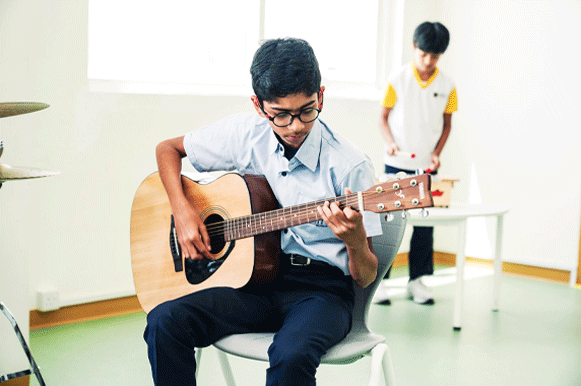
 CBSE Curriculum
CBSE Curriculum
According to the World Health Organisation, "Well-being is a positive state experienced by individuals and societies."
Schools play a crucial role in nurturing the overall well-being of students. By doing so, they contribute significantly to shaping healthier, happier individuals and, consequently, societies.
Well-being is multifaceted; it has various dimensions such as the physical, mental, and emotional. These dimensions are not isolated; instead, they are deeply intertwined, with each one influencing and being influenced by the others.
Taking care of our bodies is at the core of physical well-being. Factors such as sleep, nutrition, exercise, hygiene, and relaxation play crucial roles in shaping our physical health. For children, prioritizing physical well-being is especially vital, as it forms the bedrock of their overall growth and development.
Mental well-being boils down to how we react to life’s ups and downs. It includes our thoughts, feelings, and actions. In children, mental well-being is closely tied to their ability to handle everyday stresses, such as those experienced during exams. It significantly influences their performance in school and other activities. A child with good mental well-being is likely to be resilient, maintain a positive attitude, and enjoy life.
Emotional well-being involves understanding and managing feelings. It helps us stay positive, manage negative emotions, and build stronger bonds with others. For children, it’s about their emotional responses, behaviours, and relationships. A child with good emotional well-being can make good friendships, show kindness, and handle social situations effectively.
Physical, mental, and emotional well-being are deeply intertwined, meaning an issue in one can affect the others. For example, when we’re stressed, it can make our bodies not feel well and even make our minds feel a bit off. But when we’re good at handling our feelings, it helps our bodies and minds stay strong.
A good school usually takes a whole-school approach, ensuring that everyone, including teachers, parents, and staff, collaborates to enhance students’ wellness. Here’s how it contributes to a child’s well-being.
Balancing Well-being and Academic Success: It acknowledges the importance of both well-being and academic success. It understands that a healthy body and a stimulated mind are crucial for overall growth.
Providing a Safe and Friendly Environment: It serves as a safe haven where students can express themselves freely and feel a sense of belonging. It also creates a supportive space for students to discuss their issues informally, like the I-Care initiative in Amity School.
Fostering Supportive Relationships: It nurtures a strong support system through various groups and activities, enabling students to form meaningful relationships with teachers and peers.
Imparting Important Life Skills: It incorporates life skills education into its curriculum. Students learn critical skills such as problem-solving, decision-making, and effective communication through various subjects and activities.
Encouraging Exercise and Fun Activities: It promotes physical fitness as part of its culture. It encourages students to participate in extracurricular activities, which not only keeps them physically healthy but also boosts their mental well-being.
Promoting Resilience: It aids students in becoming more resilient, providing them with the support they need to recover from setbacks and face challenges with a positive attitude.
Providing Timely Help for the Needy: It proactively identifies students who may need extra support. By spotting signs early, it ensures that students receive the help they need when they need it.
Staff Training: It offers comprehensive training programs for every staff member, equipping them with the knowledge and skills needed to identify and address issues related to student well-being effectively.
In essence, a good school creates an environment that nurtures the holistic development of students, fostering their physical, mental, and emotional well-being.
Amity School in Sharjah is deeply committed to enhancing the overall well-being of its students. By integrating well-being into every aspect of the school experience, it ensures that students are not only academically successful but also healthy and happy in mind, body, and spirit.


